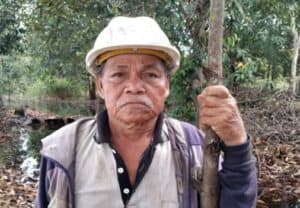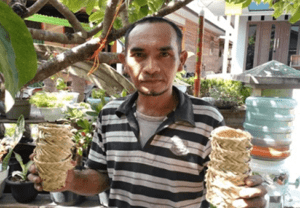In our large-scale reforestation project in Mawas in Borneo, it is the local population that does the majority of the work. Here you can meet some of them.
Since 1997 Sumadi has been planting trees in the Mawas area in Borneo. In spring he collects seedlings in the rainforest, plants them in the nursery and takes care of them as they grow. Six months later, they are ready to be planted in the forest.
“I’m always thinking, that we are doing this for the next generation. The primary advantage of this job is that it’s making a difference. And all parties benefit from the work,” he says.
Tancoan, who is also part of the project, has the same opinion.
“I like this job because we can be directly involved in replanting-activities and coorporate in reestablishing ruined areas. The forest needs to be a source of life for our children and grandchildren, so we would like to work together to replant it,” Tancoan explains.

30% of the forested area has been destroyed
The rainforest-area in Mawas is a protected area of approximately 3000 square kilometers. Before it was protected, large areas of the ancient forest was cleared. This means, that 30% of the area is now degraded forest.
Fortunately, Save the Orangutan and several of our partners work to reestablish the degraded areas and plant trees, so there will be new forest for the orangutans to live in in the future as well. The newly planted areas are simultaneously protecting the adjacent rainforest, which contains important natural resources.
The work is coordinated by our Indonesian partner organization BOS-Mawas, and it is executed by people from the local community – people such as Sumadi and Tancoan.
”It is very important for the continuity of the restoration-activities in the areas, such as replanting, blocking of channels and patrolling, to involve the local community as much as possible as direct actors,” Basman, the Reforestation Senior Coordinator as BOS-Mawas, explains.

“People’s livelihood is also found in the forests”
The work gives the locals a greater understanding of the replanting-project, as well as a say in the execution of it and a satisfying feeling of making an important difference for the forests and the future generations. At the same time, the project provides the locals with an income, and thus the replanting is not solely based on volunteering.
”It is necessary for the people, who live in Mawas, to have sustainable sources of income, so they can grow less independent of the forest,” says Basman.
When you are in a tight spot financially, it can seem like the only solution to take advantage of the nearby forest, rather than taking care of it.
Now the opposite is happening:
”When we replant, new forest grows on the soil that has been ruined by fires. In this way, living creatures can survive. This means, that the wild animals can find food in the forest, and this makes hunting an option, benefitting people,” Tancoan explains.
Hope for the ecosystems to function again
Replanting of small new trees is an extremely important element in creating new life in the ruined rainforest. But it cannot stand alone. The blocking of human-made canals and patrolling of the area are also important tasks for those, who participate in the project.
The human-made canals dries out the peat-swamp, as they drain away the water from the area, which ruins both the natural ecosystems as well as increasing the risk of wildfires. At the same time, the ruined peat-swamp forest leads to more floods, which causes problems for the locals. This is why it is necessary to block the canals, so the water can return.
The patrolling is about monitoring whether illegal activities take place in the area (an example of an illegal activity could be logging) and noticing forest fires before they run wild.
”If this area is properly protected via replanting-activities, blocking of canals and patrolling, it will give new hope for the protection of the peat swamp forest will enable the return of the ecosystem services,” says project coordinator Basman.